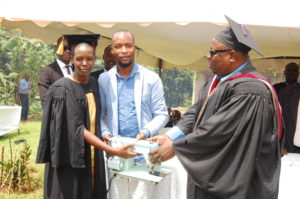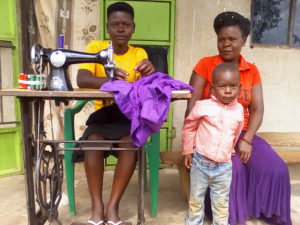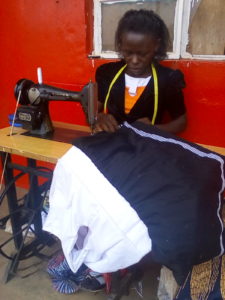By Patricia Hamill
Spring 2018
In July of 2017, Sewing Peace sent 73 refurbished sewing machines to the Mityana Open Troop Foundation (MOTF) & Vocational Project for their tailoring and designing workshops. The relationship with MOTF is a promising one and steadily growing. After the delivery, we were soon notified that these machines were put right to use and helped a number of participants earn their certificates of completion in the two-year program. Start-up machines were presented to graduates so they could move on to business ownership or employment in tailoring and sewing.
Participants, predominantly young men and women between 13 and 25 years old, are often those who have been orphaned young and have no family to depend on or those whose families cannot afford their education. Some teenagers are already parents themselves. Lack of job skills is inevitably a consequence of these factors as they have faced severe financial and social boundaries that prevent them from becoming independent earners. But with the continued availability of the vocational workshops and machines, the success rate grows and more of these people can reverse or mend their monetary dilemmas.

The vocational program does offer other courses such as hairdressing and hair weaves, carpentry and joinery, auto mechanics, agriculture, and animal husbandry, but the sewing courses are especially in demand. In July, the ratio of machines to people was 1:4, sometimes 1:5. With the additional machines, the current ratio of machine to participant in the workshops is now 1:3. According to Mathew Yawe, the Executive Director of Mityana Open Troop Foundation & Vocation Project and the country representative for Pedals For Progress/Sewing Peace in Uganda, a recent graduation ceremony that included the presentation of the sewing machines to the trainees who had completed their program “enticed and attracted more trainees from all the surrounding areas and they also brought in their children to study.” Many hope to join and to graduate with “nice sewing machines from [the] project.” The sewing department, last year, had a population of 30 trainees; this year, there was an increase to 45.
The sewing program has set up a shop in their town from which they sell some of the machines. The income enables them to pay the instructors and meet the shipping and customs costs.

One of the graduates of 2017, Resty Masane, put her new sewing machine to work on the veranda of her parents’ home in Nalyankanja, an area about 18km (11 miles) from Mityana. This 20 year old joined the vocational project in 2015. She had completed her “primary seven,” which is the last of seven years of academic study before students move on to six years of secondary schooling, but her parents did not have enough money to send her for this next stage of studies. Her parents are farmers who manage to grow enough for home consumption and have just a little left to sell or trade in order to buy other requirements. In fact, Resty’s parents paid her sewing program fees by bartering beans—a reliable crop in their climate—and maize for her vocational studies. Something of value exchanged for something of value: It’s a win-win arrangement.
Resty’s contracts include making uniforms for a village secondary school and two village primary schools. She earns between 10,000 and 15,000 Ugandan shillings (approximately U.S. $2.65 to $4.00) Since she can make 3–5 uniforms a week and also do repairs for a fee, she has an income that is reliable and a skill that will remain in demand. To add to her success, she now pays school fees for her five siblings. Resty also puts the barter system to good use by providing some uniforms to a sister’s school in lieu of paying fees. Her income also helps defray the cost of medication for her family and enables her to maintain a phone, which of course lets her stay in touch with clients and schools.

Also in 2017, Ereth Nampijja, a 21-year-old woman, graduated after taking a tailoring and fashion design course. She lives in Busunju-Mityana, located 30km (about 19 miles) from Mityana. She had been a good student, moving from primary school to completing her O levels—the exams taken after the first 4 years of secondary school—but her family could not afford to send her for the critical last two years. As a result, she could not sit for the A levels (final exams) or graduate. It was then that she approached MOTF to participate in the vocational program. Two years later, Ereth’s ambition and effort cumulated in a certificate of completion and, with what help her parents could offer, she now has a three-month lease of a space in the market where she can repair or repurpose second-hand clothes to sell from her shop or via mobile vendors who take the goods to the rural villages to sell.
Ereth averages about 7,000 Ugandan shillings (approximately $1.85) per day. This newfound financial independence allows her to rent a room near her shop and provides her with daily meals. Like Resty, she can provide funds for medication and cover school fees for her brothers and sisters. Her goals are to grow her business and to have more room to store her machine and finished products safely from the elements.
As this article was being finalized, we heard from Mathew that the recent shipment of 64 more machines reached MOTF and were being made ready for the next class session. The heavy-duty machines especially pleased him because the orders for school uniforms can also be completed with the institutions’ embroidered emblems and garments made from heavy fabrics can also be made and mended as part of the graduates’ added services offered.
As is to be expected, there are ongoing challenges for the program. These, however, are a result of the progress it has made. This growth in enrollment means that the existing workshop is at maximum capacity and the instructors often have to create shelters outside under the trees where they set up the sewing machines for classes. With the better part of six months of the year bringing substantial rainfall, this makeshift environment is not a viable long-term option. MOTF is, as always, looking to the future and plans to be able to reinvest in and improve their facilities as they continue to sell machines and bicycles from Pedals for Progress. The record of success stories can only continue to expand from here.
